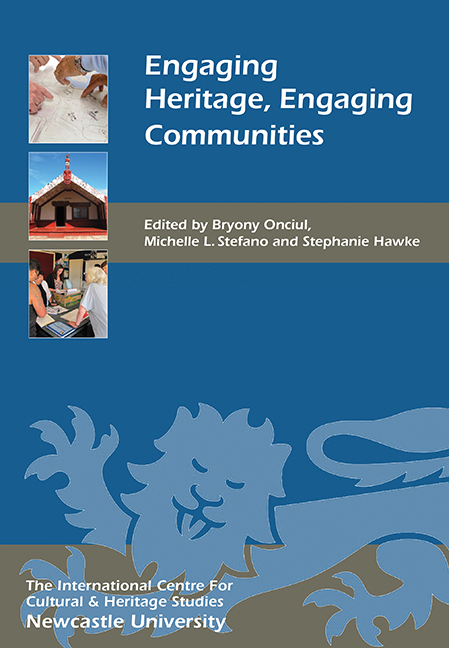Book contents
- Frontmatter
- Contents
- List of Illustrations
- Acknowledgments
- Introduction
- Engaging Concepts
- Engaging Creatively
- 7 Re-imagining Egypt: Artefacts, Contemporary Art and Community Engagement in the Museum
- 8 Interview – Evita Buša
- 9 Interview – Shatha Abu Khafajah
- 10 Engaging Communities of De–industrialisation: the Mapping Baybrook and Mill Stories Projects of Baltimore, USA
- 11 Interview – Ashley Minner
- Engaging Challenges
- List of Contributors
- Index
- Miscellaneous Endmatter
10 - Engaging Communities of De–industrialisation: the Mapping Baybrook and Mill Stories Projects of Baltimore, USA
from Engaging Creatively
Published online by Cambridge University Press: 13 April 2017
- Frontmatter
- Contents
- List of Illustrations
- Acknowledgments
- Introduction
- Engaging Concepts
- Engaging Creatively
- 7 Re-imagining Egypt: Artefacts, Contemporary Art and Community Engagement in the Museum
- 8 Interview – Evita Buša
- 9 Interview – Shatha Abu Khafajah
- 10 Engaging Communities of De–industrialisation: the Mapping Baybrook and Mill Stories Projects of Baltimore, USA
- 11 Interview – Ashley Minner
- Engaging Challenges
- List of Contributors
- Index
- Miscellaneous Endmatter
Summary
In newspapers and on television, and in museums and at heritage sites, the story of de-industrialisation in the USA is often represented through a simplistic historical lens: broad brushstrokes are used to paint the patterns of boom and bust with little interrogation of local-level, personal and shared experiences of it. This broad historical lens is rarely grounded in specific places, while simultaneously being connected to others with similar patterns of development and decline. Respecting and attempting to understand the people, places and intangible cultural heritage of industry's rise and fall from the perspectives of those living these experiences is central.
In the media and scholarly analysis statistics are frequently used to illustrate this increasingly common cycle, and the stories, memories and experiences of those affected by countless closures of manufacturing plants, mills and factories are neglected in favour of numbers. Nonetheless, how can the socio-cultural effects of bust be better conceptualised, shared and connected? Moreover, how can the complexities and nuances of the relationships between people and places of de-industrialisation be better revealed? As such, how can the human experiences of industrial decline be made more visible?
This chapter combines different perspectives and corresponding methodological approaches through which the processes and impacts of de-industrialisation can be uncovered, examined and documented for the future. In particular, this article draws from the theories and toolkits of heritage studies and interdisciplinary place-based research to discuss two ongoing projects, each focused on the effects of industrial decline in the Baltimore, Maryland region: the Mapping Baybrook and Mill Stories projects.
THE PROJECTS
Mapping Baybrook is an interdisciplinary exploration of place that virtually maps research on the history and culture of an industrial community in the southernmost tip of Baltimore, referred to as Baybrook, a merging of the names of the two remaining residential neighbourhoods in the area: Brooklyn and Curtis Bay. The community was a mix of diverse and yet connected neighbourhoods located along the southern coastline of the city during the rise of industrialisation in the USA. In addition to Brooklyn and Curtis Bay, the Greater Baybrook area once included the neighbourhoods of Fairfield, Hawkin's Point, Masonville and Wagner's Point (all now demolished and lost from the landscape).
- Type
- Chapter
- Information
- Engaging Heritage, Engaging Communities , pp. 119 - 138Publisher: Boydell & BrewerPrint publication year: 2017



